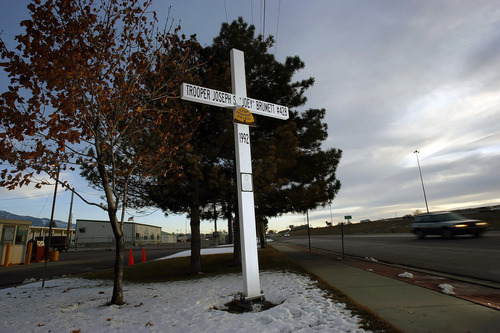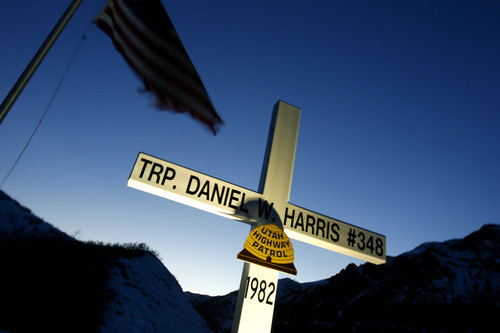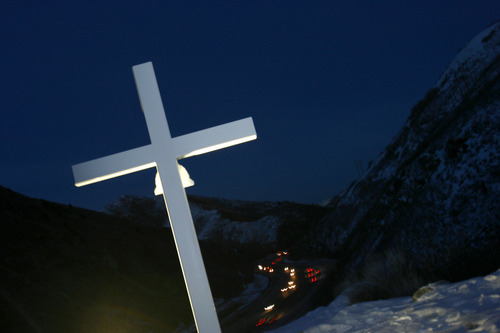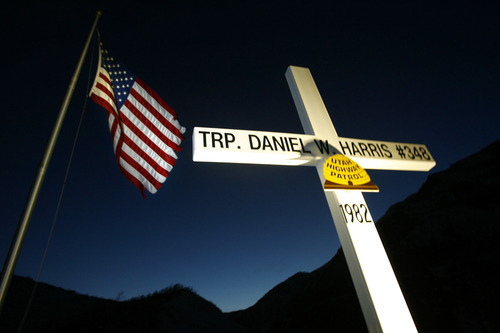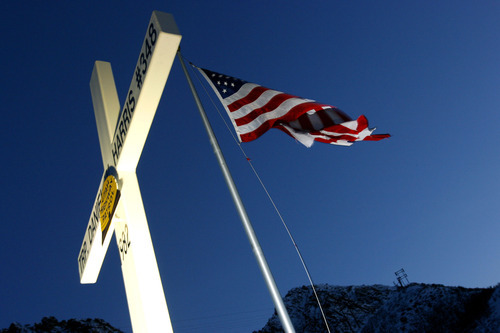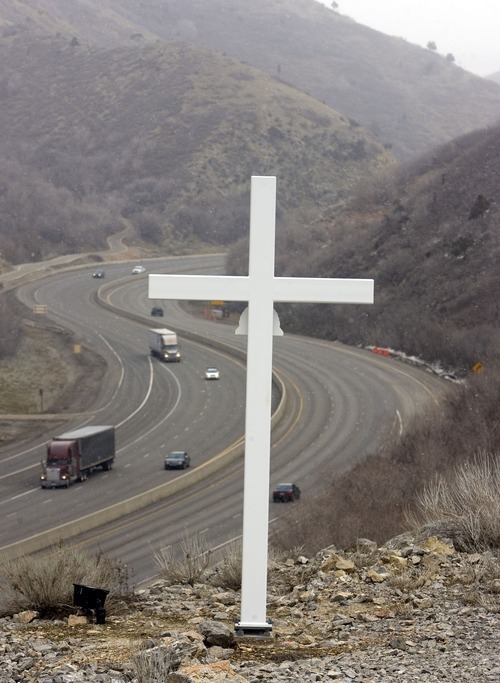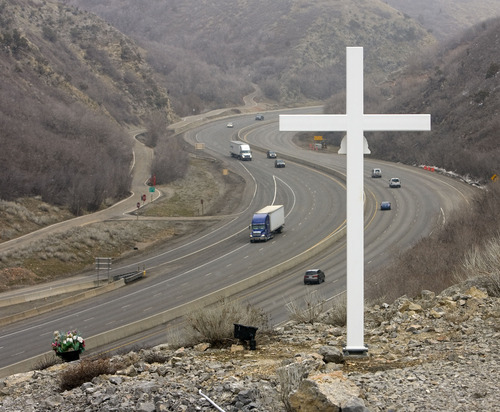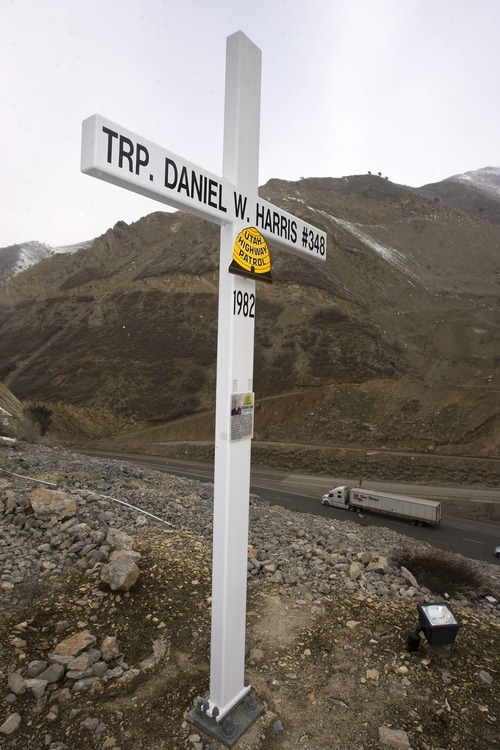This is an archived article that was published on sltrib.com in 2011, and information in the article may be outdated. It is provided only for personal research purposes and may not be reprinted.
Roughly a dozen white crosses memorializing Utah's fallen highway patrol troopers must be moved and altered or completely taken down after the U.S. Supreme Court on Monday announced it will not hear the contentious First Amendment case over the markers.
The decision marks an end to a lawsuit that has been hotly contested since 2005, but leaves larger legal questions unanswered and some families reeling.
"It was like making a fatal notification," UHP Trooper Chad McWilliams, president of the Utah Highway Patrol Association (UHPA), said of delivering the news to the families of the fallen. "I could hear it in their voices. I was crying with them. To them, it's a personal attack."
Without input from the nation's highest court, a 2010 decision from the 10th Circuit Court of Appeals in Denver, which found the crosses in violation of the U.S. Constitution, stands.
That means the 10 of the 14 white crosses that currently sit on public land either outside UHP offices or alongside a highway must either come down or be moved to private property. All 14 of the 12-foot high, crosses, whether on public or private lands, must have the UHP insignia removed.
"I would certainly hope they do [relocate them]," Utah Attorney General Mark Shurtleff, who argued in favor of the UHPA, said. "This is a blow to law enforcement, especially the families of these officers."
The UHPA does not have a timeline for removing the crosses and will weigh its options before deciding how to proceed, McWilliams said. "The cost is not an issue," he added.
With Shurtleff urging the high court to consider the case, Supreme Court justices met last week for a fourth time. But needing support from four of the nine justices to move forward, only Justice Clarence Thomas supported hearing the appeal, a position he detailed in a 19-page dissent.
Thomas saw the case as an "opportunity to provide clarity to an Establishment Clause jurisprudence in shambles," citing diverging case law concerning the constitutional language that protects against government establishing or endorsing a religion.
But Brian Barnard, a Salt Lake City civil rights attorney who represented American Atheists Inc. in its suit to have the crosses removed, said the issue at hand was too narrow for the Supreme Court to be bothered with it.
"There are no similar [publicly funded] memorial cross programs in other states. This decision is not going to have ramifications beyond Utah," Barnard wrote in a filing earlier this year.
American Atheists President David Silverman said "the American public has been spared a drama" with the court's decision.
Both Barnard and Silverman expressed hope that the UHPA would find more "suitable alternatives" for the fallen officers' memorials.
"We hope and expect the [UHPA] to not just take down the crosses but actually replace them with suitable memorials," Silverman said. "We want the fallen troopers to be honored. ... These people died serving their country and they should be honored in a way that upholds the Constitution they died protecting."
In a news release, Barnard said: "... troopers can be and should be honored with a symbol that is inclusive of all Utahns. A state-approved memorial should represent those who are not religious as well as those who are. The memorials should not emphasize one religious faith to the exclusion of all others. A memorial symbol endorsed by the state should not be religious but should be universal."
Between 1998 and 2003, the nonprofit UHPA erected 14 crosses in remembrance of troopers killed in the line of duty. Two of the crosses were placed outside a UHP office and the rest were placed along highways, including four on private land, said UHP Lt. Lee Perry.
For Ira Sachs, of Park City, crosses such as the one memorializing Trooper Daniel Harris should be left untouched. Sachs offered his land up to UHPA officials so the cross could be erected near the spot where Harris died during a 1982 chase.
"It's on private property," Sachs said Monday. "It shouldn't be disturbed. There's no reason for it."
The first memorial cross was erected in 1998, on private property. Each memorial is privately funded and owned by the UHPA, while the state owns the land on which most of the memorials sit.
Shurtleff and the UHPA have argued the crosses did not endorse a religion, but rather simply represented death and remembrance. The 10th Circuit, in its opinion last year, disagreed, calling the cross Christianity's "preeminent" symbol."
Justice Thomas, in his lengthy dissent, criticized the 10th Circuit's opinion that an observer might see the crosses and believe the "Utah Highway Patrol and Christianity had 'some connection,' leading him to "fear that Christians are likely to receive preferential treatment from the [patrol].' "
Shurtleff said he believes the Supreme Court missed an opportunity to tackle Establishment Clause issues.
"Ultimately, the Supreme Court is going to have to have a nationwide ruling on this and this was a chance to do that," Shurtleff said. "We continue with the irony that the Supreme Court meets every day under Moses and the Ten Commandments [which are depicted in stone on the outside of the U.S. Supreme Court building]. They've made it very clear you can have religious symbols in the public sector. But that's now left to each city and county and state. It's going to lead to more litigation."
Twitter: @aaronfalk


